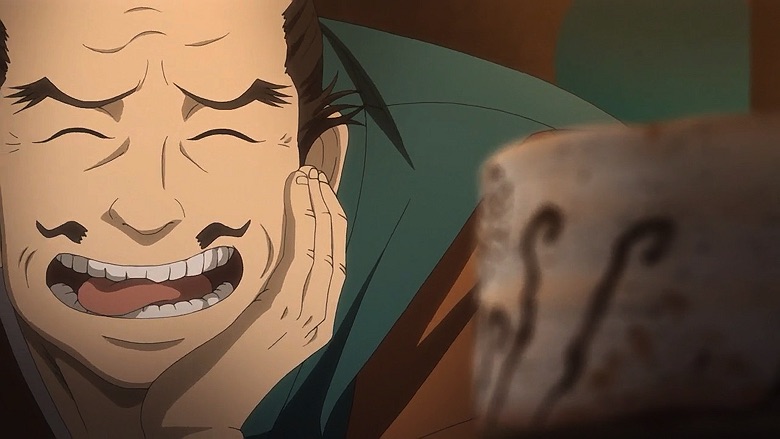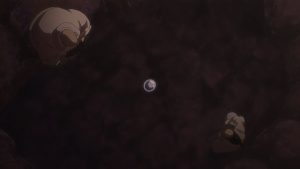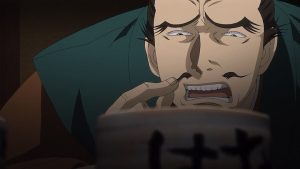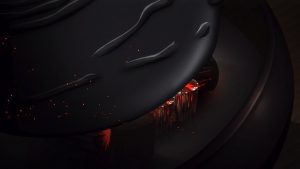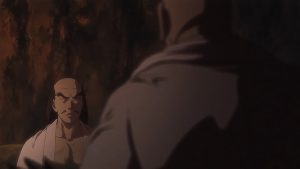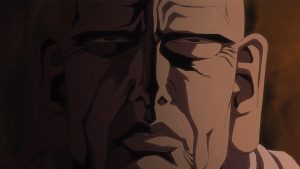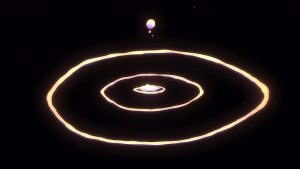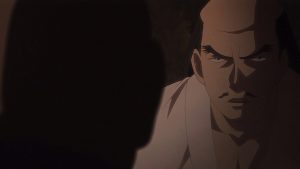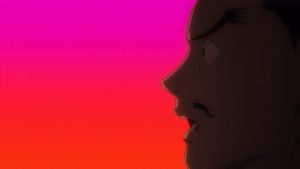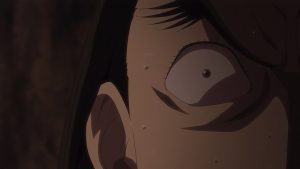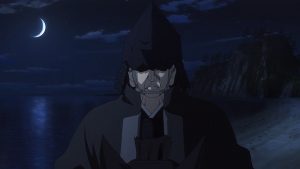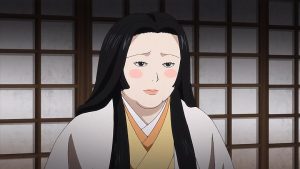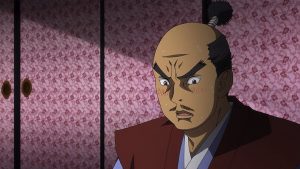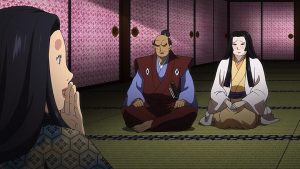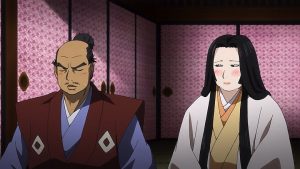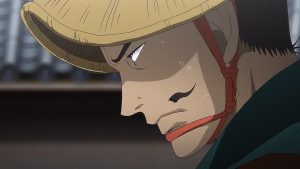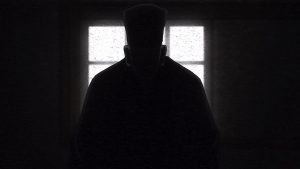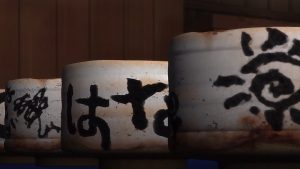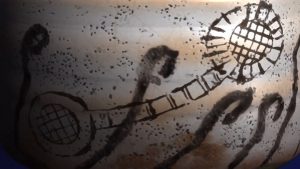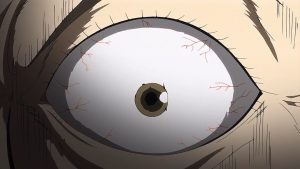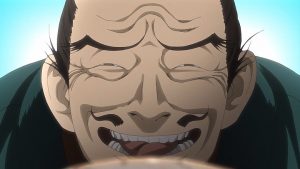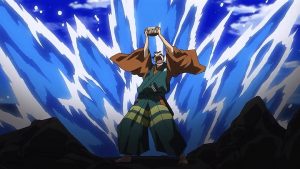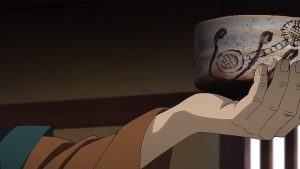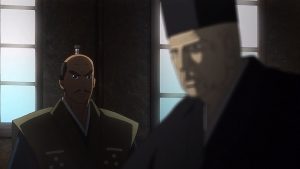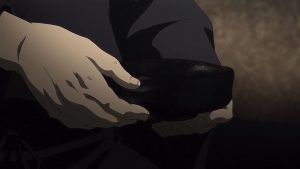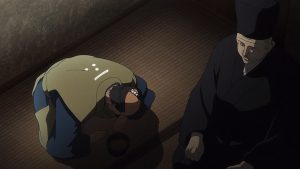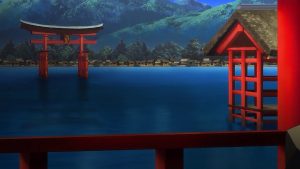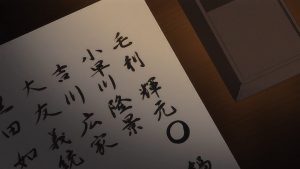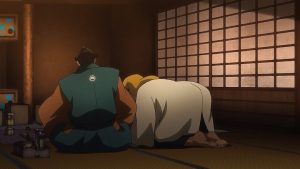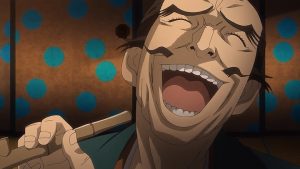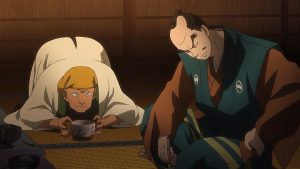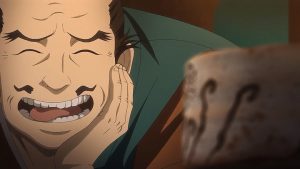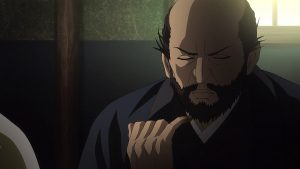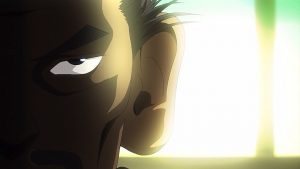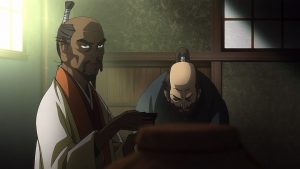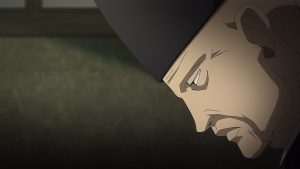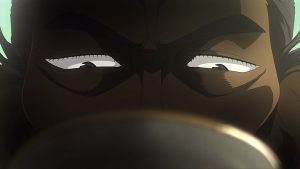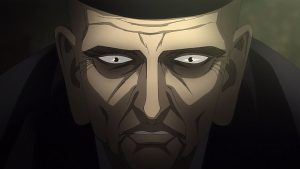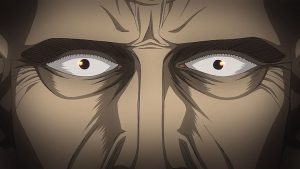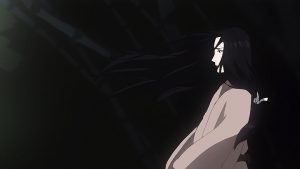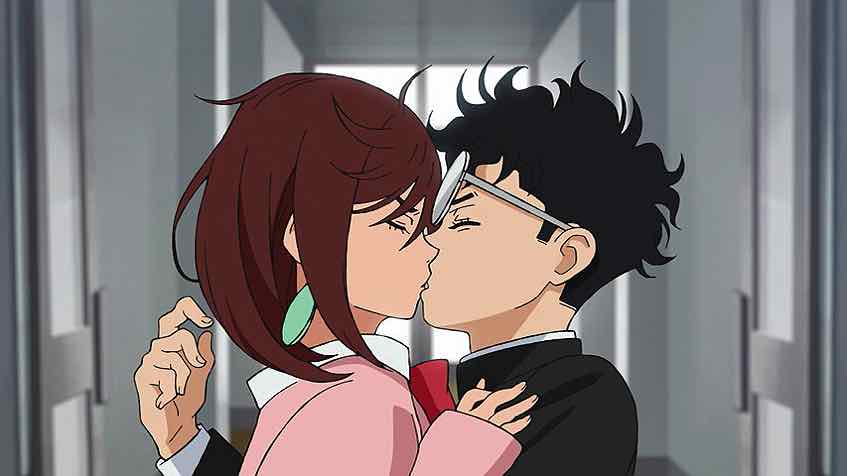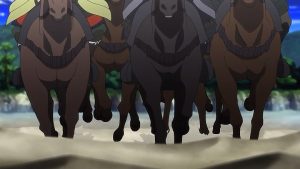 When you look for analogs to Hyouge Mono among anime, the well comes up pretty dry. Shouwa Genroku Rakugo Shinjuu, certainly – while thematically different it shares Hyouge Mono’s great sense of history and staggering intellectual depth and emotional subtlety. But even there, Rakugo was a more traditional narrative than Hyouge Mono. The sense of uniqueness to this series can sometimes make it hard to crystalize one’s reactions to it, and its complexity of theme and plot can make it a challenge to analyze.
When you look for analogs to Hyouge Mono among anime, the well comes up pretty dry. Shouwa Genroku Rakugo Shinjuu, certainly – while thematically different it shares Hyouge Mono’s great sense of history and staggering intellectual depth and emotional subtlety. But even there, Rakugo was a more traditional narrative than Hyouge Mono. The sense of uniqueness to this series can sometimes make it hard to crystalize one’s reactions to it, and its complexity of theme and plot can make it a challenge to analyze.
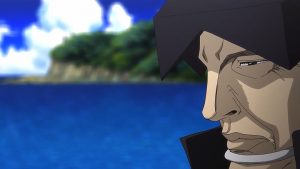 I will say this much – this episode as much as any shows Mashimo Kouichi to be capable of some of the same heights of flair that Hatakeyama Mamoru employed in Shouwa Genroku. The entire onsen scene in Atami was riveting, but the sequence with the drop from the ceiling was a stroke of genius – especially given the context. The pop of wood and shower of tiny sparks from Rikyu’s burner, the slow and careful twist of the tea bowl in his hand before he presents it to the guest – Rikyu speaks of his eye for detail here, but the series’ eye for detail is remarkable.
I will say this much – this episode as much as any shows Mashimo Kouichi to be capable of some of the same heights of flair that Hatakeyama Mamoru employed in Shouwa Genroku. The entire onsen scene in Atami was riveting, but the sequence with the drop from the ceiling was a stroke of genius – especially given the context. The pop of wood and shower of tiny sparks from Rikyu’s burner, the slow and careful twist of the tea bowl in his hand before he presents it to the guest – Rikyu speaks of his eye for detail here, but the series’ eye for detail is remarkable.
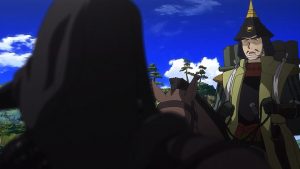 Rikyu was dropping something pretty heavy on Sasuke as that droplet of condensed steam was falling from the cave ceiling. The truth about Nobunaga’s death and his role in it had to shock Oribe-san, but even so his devotion to his master was unwavering. It’s not beyond the realm of possibility that Furuta was the first person Rikyu had ever told of his Svengali role in the Honnou-ji incident. And it should be considered that the reason for Hideyoshi’s suspicion of Rikyu is that Rikyu and he share a secret that could destroy both of them, should either become desperate enough to reveal it (though presumably that was not the reason Hideyoshi turned on Rikyu in real life).
Rikyu was dropping something pretty heavy on Sasuke as that droplet of condensed steam was falling from the cave ceiling. The truth about Nobunaga’s death and his role in it had to shock Oribe-san, but even so his devotion to his master was unwavering. It’s not beyond the realm of possibility that Furuta was the first person Rikyu had ever told of his Svengali role in the Honnou-ji incident. And it should be considered that the reason for Hideyoshi’s suspicion of Rikyu is that Rikyu and he share a secret that could destroy both of them, should either become desperate enough to reveal it (though presumably that was not the reason Hideyoshi turned on Rikyu in real life).
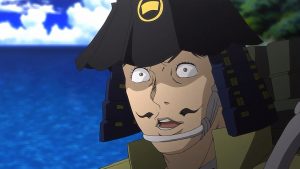 This, more than anything, seems to be weighing down Rikyu now. He sees his end approaching, and the full weight of the sins he carries is bearing down on him. Rikyu returns home to perform a ceremony for Souji (in secret of course) while Sasuke continues his pursuit of aesthetic (and commercial) pursuits. The tea bowls he’s had commissioned by a bunch of children are predictably absurd, but there’s one work of genius among them. Here we see the name Tamakichi dropped – and this is presumably Tamakichi Kato, the founder of the Seto ceramics school (though that would be a ways off in his future – he’s he’s just a brat “throwing manure”).
This, more than anything, seems to be weighing down Rikyu now. He sees his end approaching, and the full weight of the sins he carries is bearing down on him. Rikyu returns home to perform a ceremony for Souji (in secret of course) while Sasuke continues his pursuit of aesthetic (and commercial) pursuits. The tea bowls he’s had commissioned by a bunch of children are predictably absurd, but there’s one work of genius among them. Here we see the name Tamakichi dropped – and this is presumably Tamakichi Kato, the founder of the Seto ceramics school (though that would be a ways off in his future – he’s he’s just a brat “throwing manure”).
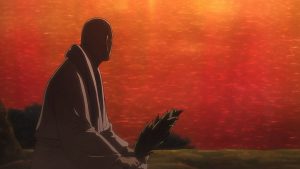 Back in Kyoto, Rikyu is holding tea ceremonies for the daimyou who will be part of the invasion of China, one by one. The Monkey sees this an an intelligence gathering opportunity, but for Rikyu it’s something else – seemingly, a chance to sow the seeds of Hideyoshi’s downfall. Perhaps guilty over having unleashed Hideyoshi on Japan he sees undoing that act as his final retribution. And in Mori Terumoto, lord of Hiroshima, he may see a likely successor – an old-school daimyou with the soul of an aesthete (in contrast to Tokugawa). And as a successor for himself, he’s already more or less anointed Sasuke – despite his still being a “child”.
Back in Kyoto, Rikyu is holding tea ceremonies for the daimyou who will be part of the invasion of China, one by one. The Monkey sees this an an intelligence gathering opportunity, but for Rikyu it’s something else – seemingly, a chance to sow the seeds of Hideyoshi’s downfall. Perhaps guilty over having unleashed Hideyoshi on Japan he sees undoing that act as his final retribution. And in Mori Terumoto, lord of Hiroshima, he may see a likely successor – an old-school daimyou with the soul of an aesthete (in contrast to Tokugawa). And as a successor for himself, he’s already more or less anointed Sasuke – despite his still being a “child”.
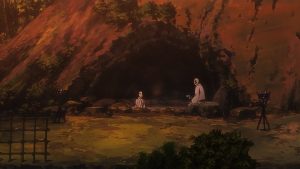 Hideyoshi senses something is afoot, to be sure. The daimyou are shifting their money around in mysterious ways, and he doesn’t buy Rikyu’s explanation for why. Indeed, this Chinese invasion is in part a way to weaken the power and wealth of individual daimyou. Hideyoshi imposes the ultimate test of loyalty on Rikyu. Not content with demanding one of the master’s finest treasures, he demands Rikyu’s daughter Ogin as well. And Rikyu’s reaction illustrates that this is not a request he will feel inclined to accede to.
Hideyoshi senses something is afoot, to be sure. The daimyou are shifting their money around in mysterious ways, and he doesn’t buy Rikyu’s explanation for why. Indeed, this Chinese invasion is in part a way to weaken the power and wealth of individual daimyou. Hideyoshi imposes the ultimate test of loyalty on Rikyu. Not content with demanding one of the master’s finest treasures, he demands Rikyu’s daughter Ogin as well. And Rikyu’s reaction illustrates that this is not a request he will feel inclined to accede to.
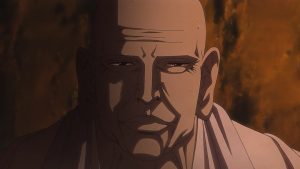 The aesthete, the warrior, the merchant – if Hyouge Mono tells us anything, it’s that the lines between these ways of being are artificially drawn and thinner than they appear. Sasuke more or less lives all three openly, slipping un-self consciously from one to the other at will. But Rikyu – the ultimate power in this mythology to be sure – is a subtler and darker specimen. He uses politics to succeed as an aesthete and aesthetic to manipulate events for political gain. How different that is from the real Sen no Rikyu we’ll never know, but it’s certainly a fascinating question – one among many Hyouge Mono presents us – to consider.
The aesthete, the warrior, the merchant – if Hyouge Mono tells us anything, it’s that the lines between these ways of being are artificially drawn and thinner than they appear. Sasuke more or less lives all three openly, slipping un-self consciously from one to the other at will. But Rikyu – the ultimate power in this mythology to be sure – is a subtler and darker specimen. He uses politics to succeed as an aesthete and aesthetic to manipulate events for political gain. How different that is from the real Sen no Rikyu we’ll never know, but it’s certainly a fascinating question – one among many Hyouge Mono presents us – to consider.


